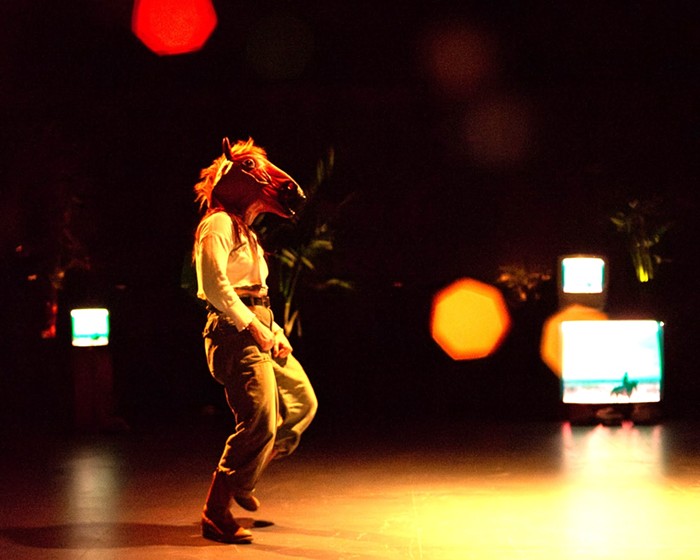"THE TRUTH is that time is infinite, and yet, there is never enough." This was one of the first things Mike Daisey said, shortly after 6 pm last Saturday, September 17, as he began the final performance of the 2011 Time-Based Art Festival. All the Hours in the Day was Daisey's sprawling, challenging, goofy, dark, wearying work in which the monologist promised/threatened to speak for 24 hours. Twenty-four hours straight. Twenty-four hours, telling one story. Twenty-four hours, with only brief breaks every 45 minutes. Twenty-four hours in what is arguably the stuffiest, darkest auditorium in the city, and inarguably the one with the least comfortable seats. All the Hours would shape up to be a huge challenge for Daisey. And the audience.
Daisey succeeded. All the Hours powered through until 6 pm on Sunday, culminating with a heartfelt dedication from the exhausted Daisey, Holcombe Waller performing a gorgeous cover of Warren Zevon's "Don't Let Us Get Sick," and a weirdly exuberant, bleary-eyed sing-along of "Lean on Me." In the space between those two 6 pms, there was a lot: a story vast and convoluted and weird enough that it doesn't even bear summarizing; two adorable young vegans frying bacon onstage; an unfortunate real-life Portlandia sketch in which a woman attempted to get everyone in the room to do yoga; a fire alarm; an outdoor sermon at sunrise; free oranges and free hot chocolate; snoring; caffeine; Adderall.
I sat through the whole thing, unlike the whimpering, mewling babies who "took breaks" to "sleep" or "eat" or "shit" or "not have to listen to Mike Daisey's voice for five goddamn minutes." I did this for two reasons, the first being that Daisey is amazing. If you haven't heard The Agony and the Ecstasy of Steve Jobs, his hilarious, heartrending, and intellectually brutal monologue on the rise/fall/rise of Apple (and Apple's labor practices), or his sharp look at American monopolization (Monopoly!), or Great Men of Genius, his four-part portrait of four crazy men (arranged by level of craziness: Bertolt Brecht, P.T. Barnum, Nikola Tesla, L. Ron Hubbard), do so and thank me later. (The Apple one, shockingly, isn't on iTunes; the rest are.) So that's reason one. Reason two was more complicated.
"I began to feel, over the last few years, that my work was pointless," Daisey said early on. "I began to want to do something... ridiculous." Which he did: He set himself up to do something preposterous, and even as he visibly fell apart, and even as the audience shrank and swelled and yawned and cheered, even as time become less linear, and even as it frequently seemed the whole messy thing would collapse on itself, Daisey stuck with it—which is why I stuck with it too.
Was Daisey's 24-hour-long story—which, unlike his more journalistic pieces, spiraled into a sci-fi fantasia of bewildering proportions—good enough to justify its length? Ehh, probably not, but Daisey's dogged performance of it clearly was. Could it have functioned in any other way? You should ask someone who didn't experience it in a profoundly sleep-deprived state. (Good luck finding them.) It was sprawling fiction with a whole lot of moving parts—some written, some improvised; some fictional, some not; some personal, some not; some trustworthy, most not. I have no idea if it could have worked better, or would have worked at all, in any other format. For fuck's sake, it involved commoditization and sex and Disney and Düsseldorfian prostitutes and Philip K. Dick wearing a Jedi robe and a crucified Warren Zevon and a few solid reasons why "33" is the best episode of Battlestar Galactica.
Regardless, at some point—and sweet Christ, I actually remember thinking this, as if it made sense—you go, "I've already been here 14 hours, what's another 10?" Or, "Whooo! Only seven hours to go!" Or, "How is he possibly going to wrap this all up in a mere three hours?" The way you think about time changes, and the way you think about art changes, and this is when you realize you'll never see anything like this again. This is when you realize that, for all its faults and despite its inevitable anti-climax, the fact you're still mostly paying attention at hour 23.75 says something pretty incredible about Daisey's intellect and skill. This is when you realize you can handle whatever performance art might be able to throw at you, that art has nothing on you, that unlike those little babies who left or took breaks or napped, you and Daisey won. And that is when you realize that both you and the man onstage have two things in common: You both might be insane, and you both need to go home and go to sleep.
Read the Mercury's live blog of All the Hours in the Day here.




















